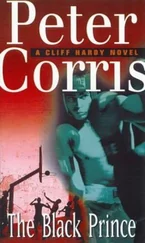Iris Murdoch - The Black Prince
Здесь есть возможность читать онлайн «Iris Murdoch - The Black Prince» весь текст электронной книги совершенно бесплатно (целиком полную версию без сокращений). В некоторых случаях можно слушать аудио, скачать через торрент в формате fb2 и присутствует краткое содержание. Год выпуска: 1973, Жанр: Классическая проза, на английском языке. Описание произведения, (предисловие) а так же отзывы посетителей доступны на портале библиотеки ЛибКат.
- Название:The Black Prince
- Автор:
- Жанр:
- Год:1973
- ISBN:нет данных
- Рейтинг книги:4 / 5. Голосов: 1
-
Избранное:Добавить в избранное
- Отзывы:
-
Ваша оценка:
- 80
- 1
- 2
- 3
- 4
- 5
The Black Prince: краткое содержание, описание и аннотация
Предлагаем к чтению аннотацию, описание, краткое содержание или предисловие (зависит от того, что написал сам автор книги «The Black Prince»). Если вы не нашли необходимую информацию о книге — напишите в комментариях, мы постараемся отыскать её.
The Black Prince
First published in 1973
To Ernesto de Marchi
The Black Prince — читать онлайн бесплатно полную книгу (весь текст) целиком
Ниже представлен текст книги, разбитый по страницам. Система сохранения места последней прочитанной страницы, позволяет с удобством читать онлайн бесплатно книгу «The Black Prince», без необходимости каждый раз заново искать на чём Вы остановились. Поставьте закладку, и сможете в любой момент перейти на страницу, на которой закончили чтение.
Интервал:
Закладка:
It was not frivolous to connect my sense of an impending revelation with my anxiety about my work. If some great change was pending in my life this could not but be part of my development as an artist, since my development as an artist was my development as a man. Rachel might indeed be the messenger of the god. She was certainly confronting me with a challenge to which I would have to respond boldly or otherwise. It had often, when I thought most profoundly about it, occurred to me that 7 was a bad artist because I was a coward. Would now courage in life prefigure and even perhaps induce courage in art?
However, and this is just another way of putting my whole dilemma, the grandiose thinker of the above thoughts had to coexist in me with a timid conscientious person full of sensitive moral scruples and conventional fears. Arnold was someone to be reckoned with. If it should come to it, had I the nerve to provoke and to face Arnold's just anger? Christian was also someone to be reckoned with. I had not even begun to settle the matter of Christian in my mind. She prowled in my consciousness. / wanted to see her again. I even felt about her bright new friendship with Arnold an emotion which strongly resembled jealousy. Her vital prying faintly wrinkled face appeared in my dreams. Was Rachel strong enough to protect me from such a menace? Perhaps this was what it was all about, my search for a protector.
So I reflected, attempting to achieve calm. But by about five o'clock of that same day I was in a frenzy again, an obscure frenzy. What was this, love, sex, art? I felt that strong urge to do something, to act, which often afflicts people in unanalysable dilemmas. If one can only act, depart, return, send a letter, one can ease the anxiety which is really fear of the future in the form of fear of the darkness of one's present desires: «dread,» such as philosophers speak of, which is not so much really an experience of void as the appalling sense that one is in the grip of some very strong but as yet undeclared motive. Under the influence of this feeling I put my review of Arnold's book into an envelope and posted it off to him. But first of all 1 read it carefully through.
Arnold Baffin's new book will delight his many admirers. It is, what readers often and innocently want, «the mixture as before.» It tells of a stockbroker who, at the age of fifty, decides to become a monk. His course is thwarted by the sister of his abbot-to-be, an intense lady returned from the East, who attempts to convert the hero to Buddhism. These two indulge in very long discussions of religion. The climax comes when the abbot (a Christ figure he) is killed by an immense bronze crucifix which accidentally (or is it accidentally?) falls upon him while he is celebrating mass.
Mr. Baffin is a fluent writer. He is a prolific writer. It may indeed be this facility which is his worst enemy. It is a quality which can be mistaken for imagination. And if the artist himself so mistakes it he is doomed. The writer who is facile needs, to become a writer of any merit, one quality above all; and that is courage: the courage to destroy, the courage to wait. Mr. Baffin, judging by his output, is incapable of either destroying or waiting. Only genius can afford «never to blot a line,» and Mr. Baffin is no genius. The power of imagination only condescends to lesser men if they are prepared to work, and work consists very often of simply refusing all formulations which have not achieved the density, the special state of fusion, which is the unmistakable mark of art….
And so on for another two thousand words. When I had folded this up and posted it I felt a solid, but still rather mysterious, sense of satisfaction. My action would at least precipitate a new phase in our relationship, too long stagnant. I even thought it possible that this careful assessment of his work might actually do Arnold good.
That evening Priscilla seemed to be a little bit better. She slept all the afternoon and woke up saying she was hungry. However she took only a little of the clear soup and chicken which Francis had prepared. Francis, my view of whom was undergoing modification, had taken over the kitchen. He came back with no change from my pound, but with a fairly plausible account of how he had spent it. He had also fetched a sleeping bag from his digs and said he would sleep in the sitting-room. He seemed humble and grateful. I was busy stifling my misgiving about the risk of so «engaging» him.
For I had decided, though I had not yet told Priscilla, that I would shortly depart for Patara, leaving Francis in charge. That much of the future I had settled. How Rachel would fit in was yet unclear. I imagined myself writing her long emotional letters. I had also had a long and reassuring conversation with my doctor on the telephone. (About myself.)
For the moment however behold me sitting with Priscilla and Francis. A domestic interior. It is about ten o'clock in the evening and the curtains are drawn.
Priscilla was again wearing my pyjamas, the cuffs liberally turned back. She was drinking some hot chocolate which Francis had made for her. Francis and I were drinking sherry.
Francis was saying, «Of course one's memories of childhood are so odd. Mine look all dark.»
«How funny,» said Priscilla, «so do mine. It's as if it's always a rainy afternoon, that sort of light.»
I said, «I suppose we think of the past as a tunnel. The present is lighted. Farther back it gets more shadowy.»
«Yet,» said Francis, «we often recalled the remote past with greater clarity. I can remember going to the synagogue with Christian-«To the synagogue?» I said.
Francis was sitting cross-legged in a small armchair, filling it completely, looking like an image in a niche. His floppy wide-legged trousers were stiff with dirt and grease near to the turn-ups. The strained knees thereof were threadbare and shiny and hinted at pink flesh beyond the veil. His hands, podgy and also very dirty, were folded in his lap in a complacent position which looked faintly Oriental. He was smiling his red-lipped apologetic smile.
«Why, yes. We're Jewish. At least we're partly Jewish.»
«I don't mind your being Jewish. Only oddly enough no one ever told me!»
«Christian is sort of, well, not exactly ashamed of it-or she was. Our maternal grandparents were Jewish. The other grandparents were goy.»
«Rather funny about Christian's name, isn't it?»
«Yes. Our mother was a Christian convert. At least, she was the slave of our father, an awful bully. You never met our parents, did you? He wouldn't have anything to do with our Jewish background. He made our mother break off relations. Calling Christian 'Christian' was part of the campaign.»
«Yet you went to the synagogue?»
«Only once, we were quite small. Dad was ill and we stayed with the grandpops. They were very keen for us to go. At least for me to go. They didn't care what Christian did, she was a girl. And her name disgusted them, though they did call her by her other one.»
«Zoe. Yes. I remember her getting her initials C. Z. P. put on a rather expensive suitcase-God.»
«He killed my mother, I think.»
«Who did?»
«My father. She was supposed to have died after falling downstairs. He was a very violent man. He beat me horribly.»
«Why did I never know-Ah well-The things that happen in marriage-murdering your wife, not knowing she's Jewish-«Christian got to know a lot of Jews in America, I think that made a difference-I stared at Francis. When you find out that somebody is Jewish they look different. I had only after many years of knowing him discovered that Hartbourne was a Jew. He immediately began to look much cleverer.
Priscilla was restive at being left out of the conversation. Her hands moved ceaselessly, creasing the sheet up into little fanlike shapes. Her face was thickly patchily powdered. She had combed her hair. Every now and then she sighed, making a woo-woo-woo sound with a palpitating lower lip.
Читать дальшеИнтервал:
Закладка:
Похожие книги на «The Black Prince»
Представляем Вашему вниманию похожие книги на «The Black Prince» списком для выбора. Мы отобрали схожую по названию и смыслу литературу в надежде предоставить читателям больше вариантов отыскать новые, интересные, ещё непрочитанные произведения.
Обсуждение, отзывы о книге «The Black Prince» и просто собственные мнения читателей. Оставьте ваши комментарии, напишите, что Вы думаете о произведении, его смысле или главных героях. Укажите что конкретно понравилось, а что нет, и почему Вы так считаете.










